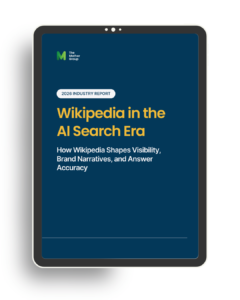TL;DR: Wikipedia only accepts information backed by high-quality, independent, and editorially controlled sources. The best citations come from reputable news outlets, academic publications, industry journals, and books, not press releases, company blogs, or paid content. Understanding what qualifies as a “reliable source” is essential for creating or maintaining a Wikipedia page that won’t get flagged, challenged, or removed.
Successfully creating or editing a Wikipedia article requires careful adherence to Wikipedia’s strict sourcing guidelines. If you don’t care if your Wikipedia edits remain for longer than a day, then you don’t need to worry about the rules. If, however, you want to create a stable, respected article, you need this guide.
There are over 170 different language versions of Wikipedia available. Each of them have their own individual sets of editorial guidelines, including what makes a reliable source. This guide is for the English language version.
Continue reading for information on what qualifies as a reliable source, what doesn’t, and how to give your Wikipedia creations the best chance of survival.
Table of Contents
Summary of Top Points
- Always provide citations for any information added to Wikipedia.
- Avoid any sources that are self-published or directly affiliated with the subject.
- Stick to respected, peer-reviewed, or major news sources.
- Ensure sources have significant coverage of the subject.
- If content is removed, find one or more reliable sources before adding it back.
Why the Focus on Reliable Sources?

Reliable sources are an integral part of Wikipedia. Without sources, readers have no foundation of trust for the content they are reading. If an article has no sourcing or poor sourcing, it will be flagged or recommended for deletion.
- Flags are displayed at the top of pages. They inform readers of any page issues. Ultimately, they are a stamp that a page is anywhere from slightly to severely untrustworthy.
- For more on the deletion process see What to do When Your Wikipedia Article is Deleted.
Key Qualifications for Reliable Sources
Wikipedians look for three main criteria when reviewing sources:
- Verifiable – According to Wikipedia, “verifiability means other people using the encyclopedia can check that the information comes from a reliable source.” In other words, to be verifiable, any link that you provide, or any book you reference, must be easy for another editor to find, and the information you claimed is there, must be there.
- Independent and Reliable – All sources must be from second or third parties that are fact-based and trustworthy. If someone directly associated with the topic of the Wikipedia page is quoted in the source, that quote cannot be used.
For example, if you have 15 articles from major news publications that you want to use, but the only coverage in the publication is a quote from the CEO of the company you want to write about, you will be caught trying to game the system and the citations will be flagged as not reliable.
- Notable – The topic of the Wikipedia page must be significantly covered in the source in order to establish notability. This is often overlooked but it is very important, especially for new pages.
Ideally, at least a few sentences of the article should be devoted to the company or individual you want to write about. More is always better. A good rule of thumb is that if the article is about the company or individual you want to write about, it probably meets the “significant coverage” criteria – bonus points if the company/individual’s name is in the title.
If you are drafting a new page, you need at least three to five sources that meet all of the criteria. If you are unable to find enough sources, your topic is not ready for a Wikipedia page.
You need to have a source for anything that someone could challenge, something someone already has challenged, or any time you directly quote someone. When in doubt, err on the side of needing a source.
Reliable Sources

The best reliable sourcing is: Significant mainstream news coverage (The New York Times, The Wall Street Journal, The Washington Post, Financial Times, etc.), or other significant third-party coverage (news articles, features, profiles, etc.).
Additional reliable sources include:
- Academic and peer-reviewed publications
- University-level textbooks
- Books published by respected publishing houses
- Magazines
- Journals
- Newspaper and magazine blogs (exercise caution here because the blogs might not be subject to the same fact-checking process as other parts of the newspaper, and might be too opinion-based to count as reliable)
- Almanacs
- Encyclopedias (but not Wikipedia)
Source Selection Tips:
- Secondary coverage > primary – For example, a paper reviewing existing research is a better citation than using a primary research paper itself.
- Consider the publication date – Older sources may be outdated, while breaking news may lack verification.
- Neutral POV – Wikipedia aims to describe disputes, but not engage in them.
- Avoid copyright violations – Do not copy content verbatim.
For more guidance, refer to Wikipedia’s assessment of various sources. This list isn’t exhaustive, but it is a good starting point and will help you understand how Wikipedia judges publications.
Examples of Reliable Sources

- National news articles from The New York Times, Washington Post, BBC, Bloomberg News, Rolling Stone, Variety: Larger, trusted publications always take precedence on Wikipedia.
- A featured piece in a peer-reviewed journal about a cutting edge medical technique.
- Featured article in Food & Nutrition exploring experiences and science behind a specific enzyme, or impacts of a new diet on biological health markers.
Remember: A lack of reliable sourcing is one of the most common reasons new drafts are declined and existing pages are flagged or recommended for deletion.
Unreliable Sources

Certain sources are automatically flagged as unreliable due to conflicts of interest or lack of editorial oversight. Avoid using:
- Any primary source: Blogs, self-published news, internally-produced interviews, videos, company or personal websites, etc.
- Social media posts and opinion articles
- Press releases: No matter where they are published
- Sponsored content: Branded articles, Forbes contributor pieces, modern Newsweek content (post-2013)
- User-generated content: Reddit content, Amazon reviews, TVTropes, IMDb, etc.
- Interviews: Except in a few very specific, uncontroversial circumstances
- Wikipedia itself
A possible exception here is annual reports. People frequently ask if these are okay to use for the revenue numbers found in info boxes. Technically, annual reports go against Wikipedia’s wishes, but this seems to be a gray area for editors. We recommend that you try to find other sourcing for financial stats and, if you have to default to annual reports, only use them to source info box data.
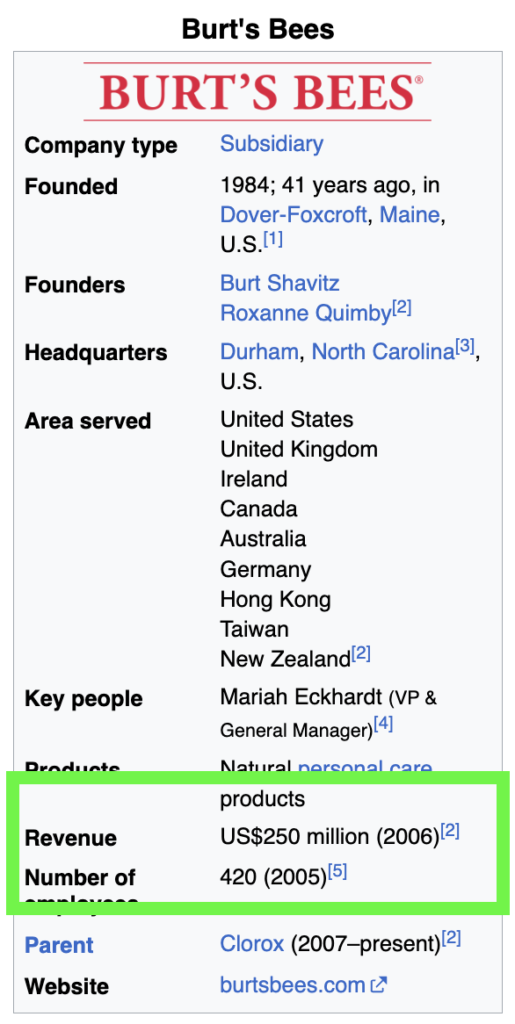
Examples of Unreliable Sources
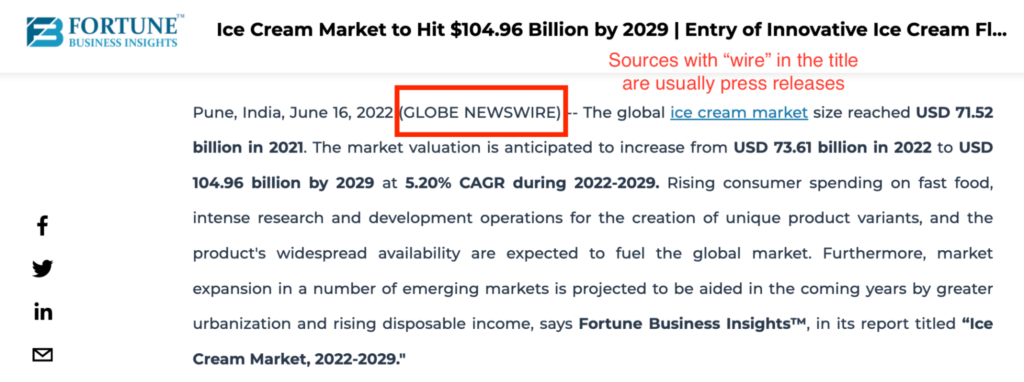
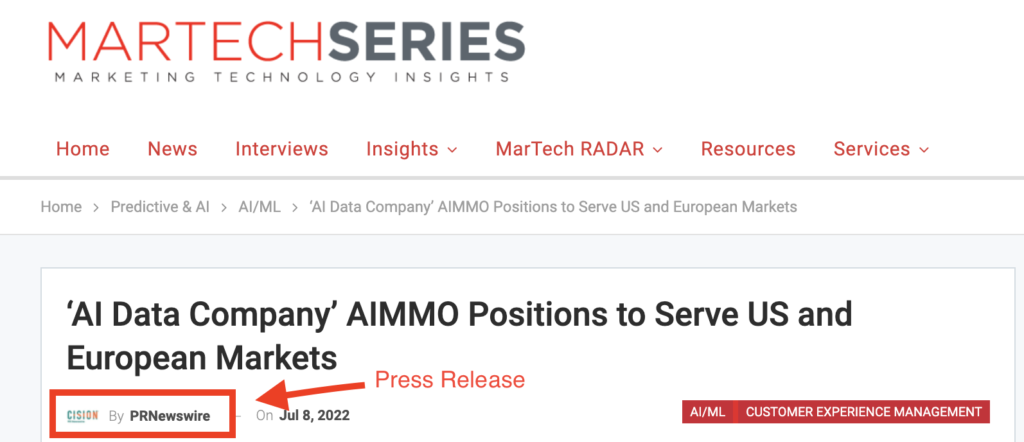

Further Examples
- Interview with employee/CEO posted on company website/blog
- Third-party reprint of primary coverage (primarily press releases)
- A news article about a contentious idea absent of general scientific and/or public consensus
- Sponsored content marketed as articles
- Anything from the Guinness Book of World Records, IMDb, Forbes.com contributors, Newsweek (post-2013)
Gray Areas

Source reliability falls on a spectrum. While some types of sources are always bad, others cannot always be said to be reliable or unreliable. Editors have to use their best judgment to determine what is usable and inappropriate, and can draw upon the advice in this guide for help.
How to React When an Editor Disagrees With Your Assessment of a Source

If information is removed because of a citation issue, do not try to add it back without having one or more reliable sources you can include. If you believe your original source met Wikipedia’s criteria, or if you find a new source you think is reliable and use it to add the content back, but someone else deletes it anyway, be very careful of ending up in an edit war. You want to avoid these. If you’re locked in a back-and forth battle with the same content being added and deleted over-and-over again, move the conversation to the Talk Page and ask for help.
We have more on edit wars and Talk Page discussions below.
What Happens if You Use a Bad Source?
While some improperly sourced pages do exist on Wikipedia, they are at risk of being corrected or removed at any time.
If unreliable sources are used, the following may happen:
- Content changes – The content attributed to the unreliable source can be challenged, deleted, or replaced
- Content may be flagged – examples: “Citation Needed” or “Conflict of Interest”
- You can find yourself in an edit war or talk page argument with difficult editors
- Page locks and account blocks
Content Changes
These are the four most common Wikipedian reactions to “bad” content:
- Deleted: Editors will delete the information added to the page either by manually removing it, or by reverting the entire page back to a previous state.
- Challenged: The content of the edit in question may be discussed on the Talk page. The editor who made the initial “bad” content addition may have to justify their actions.
- Edited/Replaced: The content could be altered to be neutral, or additional context could be added from other secondary sources. If this happens, you can check your page’s “View History” tab to see why someone edited the information. The editor will probably include a note with the edit that says something like, “no source/bad source.” (A bad source could be a source that doesn’t focus on the topic, or a source with a bad link.)
Flagged: The sentence, section, or entire Wikipedia page could be hit with various flags and restrictions until the content is reviewed and edited or removed.
Page Flags

Here’s what you need to know:
- Page flags are also known as templates. They alert readers and users alike of issues with specific pages, sections, and pieces of content.
- These flags can be added by anyone at any time. There are no hard rules around either the addition or removal of flags, although removing flags is generally more difficult than adding them.
- There are over 50 different content flags alone, and hundreds in total. While a lot, it’s good to know that not all flags are punitive; some are used for maintenance projects.
- Wikipedia flags can be the first step to a better page, but they can also be the first step down an ugly road of reverted content, edit disputes, page protections, and page deletion.
- Pros/Cons: Flags give you time to find a reliable source before content is removed, or they might even lead to another editor finding a source for you – but they also tell discerning readers to question the trustworthiness of the flagged content.
Edit Wars and Talk Page Discussions
Edit wars are unproductive. They consist entirely of one editor adding content, another editor removing it, and repeat ad infinitum. They can lead to either constructive or equally unproductive Talk Page discussions.
If you find yourself in a battle, remember the rules of engagement:
- Be polite and respectful at all times regardless of the other editor’s behavior.
- Assume good faith when a new editor enters the fray; give them a chance to help.
If new editors are combative or rude (unlikely but possible), you can request further help by seeking a dispute resolution.
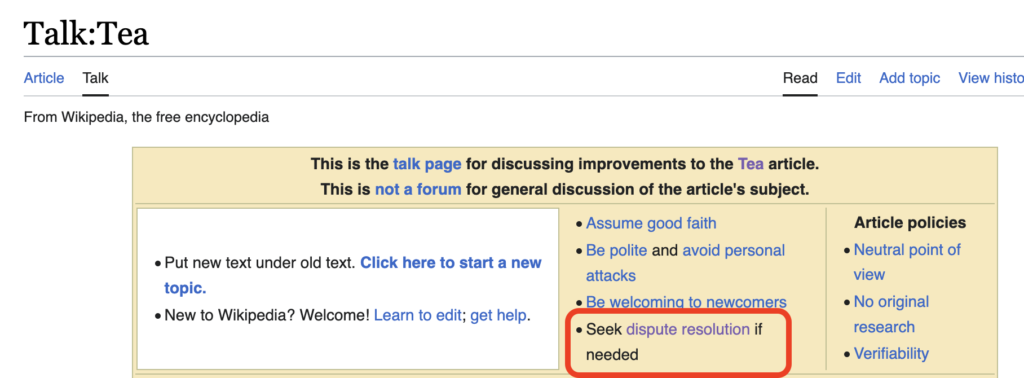

Talk Page Discussion Example (Friendly)

Talk Page Discussion Example (Caesar Salad Edit War)

Talk Page Discussion Example (Caesar Salad Talk Page)

Page Locks and Account Blocks
Two of the most severe actions that can be taken are page locks and account blocks.
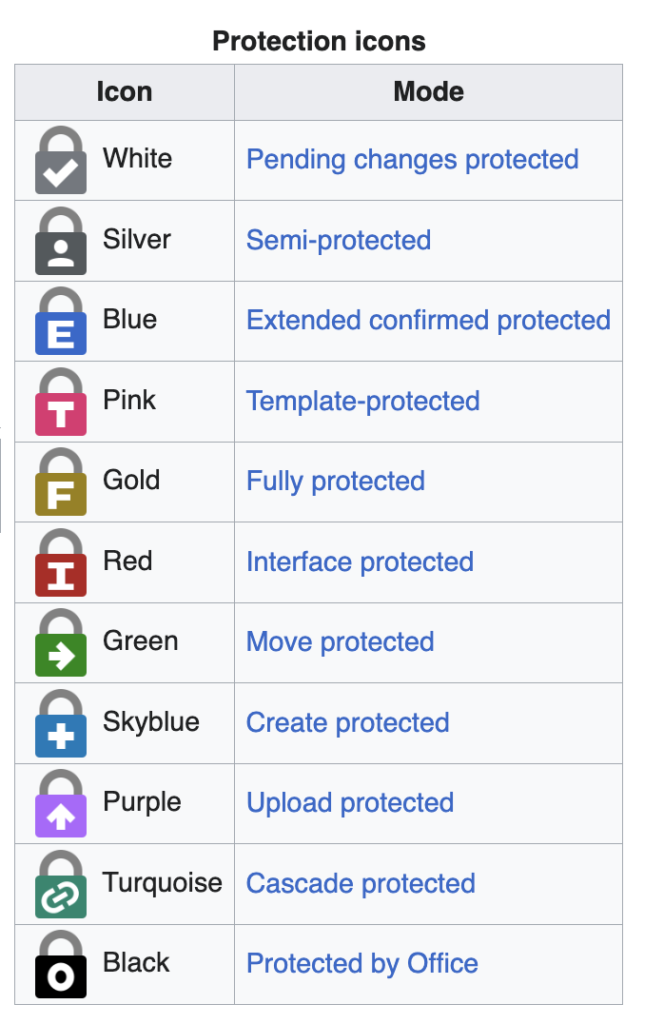
- Page Locks – This action allows only certain editors to edit a page. There are different protection levels that determine what kinds of Wikipedia accounts can access protected pages and edit them. Page locks are often implemented because of repeated attempts to abuse Wikipedia guidelines, such as reliable source policies. They can be temporary or indefinite, and can only be removed by high-level administrators through request and discussion.
- User Account Blocked – If users fail to respond to correction, consistently use unreliable sources, and craft unverifiable or biased content, their account can be blocked. A block can be appealed by following the steps found here.
While there is a lot that can go wrong, once you know the appropriate types of sources to use, editing does get easier. At least, it does as long as you follow Wikipedia’s other content guidelines. For more information, check out our blog and our latest book Wikipedia for Business 2025: Successful Strategies for Marketers & Communicators.
Need Help?
Following these guidelines will increase the likelihood that your Wikipedia edits and pages remain intact. If you need further guidance, feel free to reach out to us for expert assistance!


